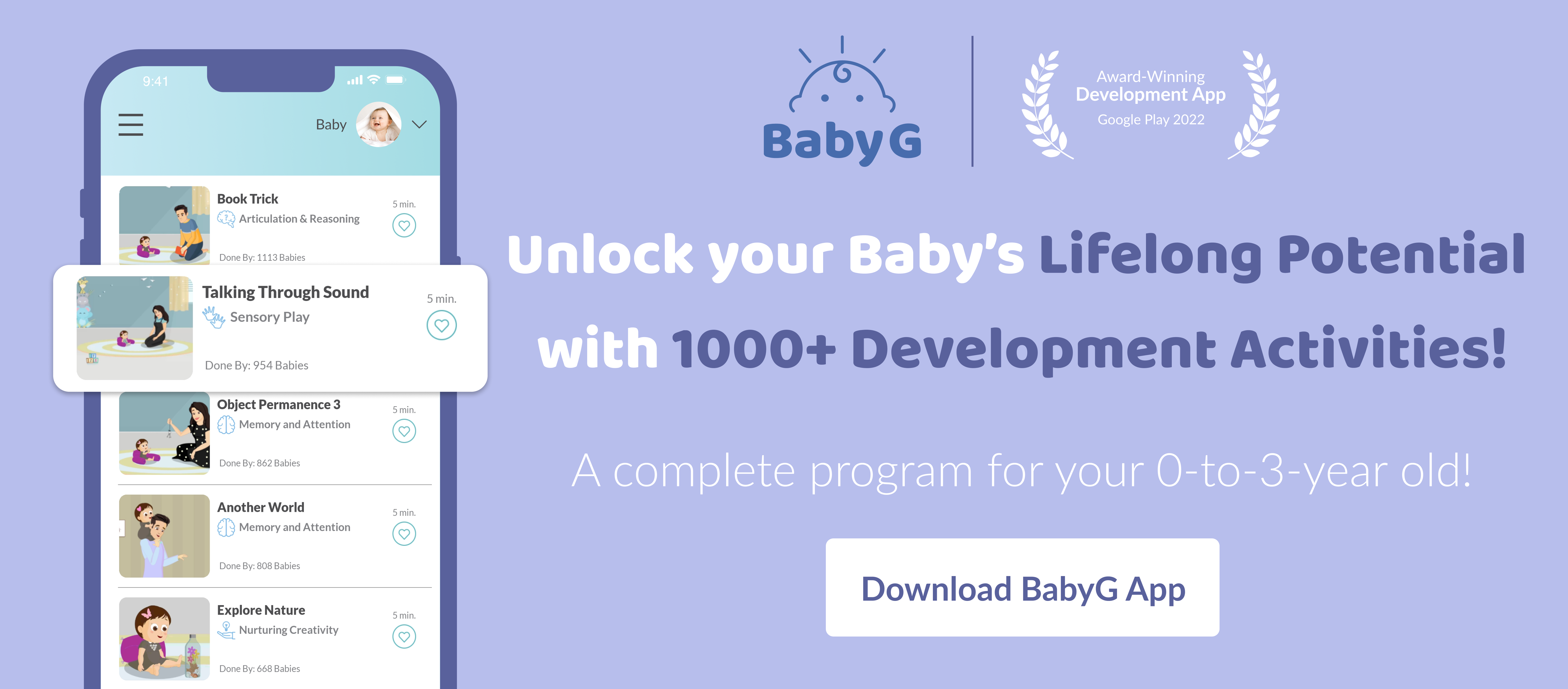
What Milestones Should My 7 Month Old Have?
Physical Development Milestones For 7 Months Baby
At the seventh month your child is slowly getting better at their motor skills. They can practice better balance and sit with or even without your support. Can use the whole of their palm to inspect an object and learn the skill of hand-to-hand transfer.
1. Rolling
Your infant will be strong enough to be able to roll over 360 degrees onto their sides.
Completion Rate on BabyG App: 80% Babies
Importance: Prior to reaching this milestone, your baby will attempt rolling from their stomach onto their back and vice versa. Its accomplishment of the 360-degree roll indicates that your baby has enough strength in their limbs and is even learning how to control them. The movement employs segmented use of muscles that aid in promoting sequential motor skills, which is key for the coordination required for crawling and walking.
What if my baby does not complete this milestone?
While it is fine if your child is not a fan of rolling over, if you do not notice any signs that point that your child is trying to be mobile by shuffling or scooting then you may want to point it out to the pediatrician.
2. Reaches Out When in a Sitting Position
They will extend their body forward from a sitting posture by stretching ahead to reach the objects that are slightly away. The act of coming back to their starting position showcases better body balance.
Completion Rate on BabyG App: 86% Babies
Importance: The milestone engages a combination of muscles and strategies to reach for the object optimally. The prime muscles used for sitting are activated while the baby understands the level of stability and the spacial distance required to complete the task.
What if my baby does not complete this milestone?
Many babies mater the milestone by the ninth month. Hence, allow your child to work on stimulating the muscles required with activities that build back, leg, and hip muscles.
3. Standing with Support
Babies this age will begin to bear their body weight on their legs and stand while holding a support object to maintain balance.
Completion Rate on BabyG App: 69% Babies
Importance: The muscles they employed for rolling and crawling come into use when standing with support. Motor coordination and muscle strength are put to use as they work their core, leg as well as arm muscles extensively to maintain their stability. With practice they will learn to distribute weight between both legs much more effectively for balance.
What if my baby does not complete this milestone?
Standing is a major milestone. It is fine if your baby doesn't pull themselves in a standing position at the seventh month. They have a lot of time to practice and master the skill.
4. Palmar Grasp with Thumb
This month, your baby will start using their thumb while grasping objects. This is important because your baby is now exercising their entire palm as they engage in activities.
Completion Rate on BabyG App: 90% Babies
Importance: Often called a radical palmar grasp, this employs the use of the thumb and its side. The active working of all the fingers and the thumb allows for a much more precise and firm grasp.
What if my baby does not complete this milestone?
Mastering the radical palmar grasp may take another month. If your child isn’t keen on exploring objects in their surroundings and uses a raking grasp rather than a palmar grasp, then it is best to bring it to your doctor’s notice.
5. Pincer Grasp
Your seven-month-old now will even make use of their index finger and thumb to pick up tiny objects of grain size.
Completion Rate on BabyG App: 63% Babies
Importance: What may start as an early pincer, employing the index, middle, and the thumb finger, your baby’s skills will gradually refine with the precision of aim and strength. This is a huge milestone for your child in terms of their fine motor skills.
What if my baby does not complete this milestone?
This particular milestone might take a year to master, with constant practice and drive.
Important Fine Motor Skills for Baby: The Pincer Grasp
7 Months Baby Activities To Reach Physical Development Milestones
Here are some of the 7-month-old baby physical milestone activities to help your child develop their gross and fine motor skills right from infancy
1. Walking on Legs
Stimulate the muscles required for the ‘Standing with Support’ milestone, with this fun exercise. Support your child from their underarms and help them stand on their legs. Next, allow your child to take control of the momentum forward as you handle their weight. This encourages her to walk and understand spatial awareness.
Frequency: Once a day for a week
2. Rotating on Stomach
Here’s an excellent exercise to practice ‘Rolling’. Set your baby down on a smooth surface like a blanket. While he is on her tummy, bring a toy up to him and place it to her right, such that he has to rotate to grab it. Move the toy further away as he gets close until he completes a full circle. Repeat the same in the opposite direction. This boosts muscle coordination and strength for crawling.
Frequency: Once a day for a week
Activities such as these can be great to keep the momentum of motor development going. Not only that it is also a breath of fresh air wherein you and your child can spend quality time with each other. Find more engaging and 7 month old developmental activities for your little one in the BabyG app.
Cognitive Development Milestones For 7 Months Baby
Here’s what to look forward to in terms of cognitive development by the 7th month.
1. Ability to focus and Engage Independently
Your child will actively engage independently with objects surrounding them, as well as focus and pay attention to people or objects you introduce them to. Take a toy for example, if it is even ideally lying around your child will reach for it to play, without you having to intervene or hand it to them.
Completion Rate on BabyG App: 95% Babies
Importance: The deeper focus allows your young one to interact with the sensory elements and the people around them better. Their curiosity is satiated with early communication skills and gradual development of motor skills.
What if my baby does not complete this milestone?
If your munchkin seems to lack focus or has trouble playing independently, it could be due to factors such as overstimulation and unfamiliarity with their surroundings. On the other hand, if you see a constant struggle to focus or low interest in objects or people in your child, then please mention it to your pediatrician.
2. Ability to anticipate Movement
Your child will now be able to anticipate the movement of falling objects. When you drop a ball, for example, they will understand that by movement it will likely fall downwards. They will track the balls movement with their eyes as it falls from top to the bottom.
Completion Rate on BabyG App: 80% Babies
Importance: The milestone is boosted by the infant's ability to track the movements of an object with its eye. Which has to be developed optimally, since the limited motor skills of infants. The completion of this milestone gives way to cognitive, social, and linguistic developments in children.
What if my baby does not complete this milestone?
Babies usually start tracking with their eyes at about three months on. Since the concept of cause and effect is complex, they may take up to 18 months to learn the same. You can help lay a firm groundwork of the concept with activities, stories and active usage of motherese.
3. Preference towards specific Foods
Now that they are seven months old, you may have started their journey with solid foods already. As you introduce different foods to your child, you’ll notice that they showcase strong preferences towards certain foods over others. This will be done through the expanse of facial expressions. So, next time you feed them something new to eat, be on the lookout for such, to understand whether they like it or not.
Completion Rate on BabyG App: 84% Babies
Importance: The ability to come to a decision and communicate their likes and dislikes provides exemplary insights into a child's tastes and preferences. These equip primary caregivers with cues to make for effective communication. All of these are leaps and bounds of development in terms of cognitive skills such as promoting autonomy, decision making, and building individuality.
What if my baby does not complete this milestone?
An infant's exposure to foods is relatively new. Their taste preferences are still developing. It is integral to remember that it may take multiple exposures to a particular food before your child develops a preference for it. Until then, continue offering your baby a variety of nutritious food to help them explore variety of tastes and textures.
7 Months Baby Activities To Reach Cognitive Milestones
Here are some of the activities to help your child develop their cognitive skills right from infancy
1. Sound and Light
Help your child understand the concept of cause and effect mentioned in the ‘Ability to anticipate Movement’ milestone. Take a squeeze toy and bring it close to your baby. Give it a few squeezes while your child observes the movement and related it to the sound. Next, you can take your child to a light switch and flick it on and off a few times.
Frequency: Once a day 3 - 4 weeks
2. Explore Nature
Stimulate the ‘Ability to focus and Engage Independently’ with this fun and creative activity. Inciting the love for nature and exploration, the next time you go out to the beach with your baby, collect pebbles, seashells, flowers and place them in a transparent bottle. Hand the bottle to your child every day, to play with and recollect the memory of the outing.
Frequency: As and when you can
Remember to talk your child through the activity as you proceed to help your little one ease into them. Such engaging activities are vital to help your child build on their developmental skills one play at a time. Also, to be a step ahead, never miss a beat with trackers to check baby’s milestone progress.
Communication Development Milestones For 7 Months Baby
Imitating the sounds that you make along with a collection of familiar expressions is how your child will likely communicate within the seventh month. Parents or caregivers can make use of their non-verbal skills to initiate conversations with their babies. Such back and forth instills the base of a ‘conversation’ which is integral in setting a substantial groundwork for a child’s communication development.
1. Early Conversation
Your infant will now get a grasp on how a conversation flows, with each person taking turns while speaking. So when you 'conversate' with him/her they will babble while taking turns and make adequate eye contact.
Completion Rate on BabyG App: 81% Babies
Importance: This back-and-forth of responses helps your infant in building their early language skills as well as stimulates their social interactional infrastructure. Such 'conversations' aid in presenting them with the rules of a conversation and are key to understanding verbal cues.
What if my baby does not complete this milestone?
Try to create a consistent daily routine of 'talking' to your baby, this could be as vocalising with them in response or using motherese. Keep in mind that the timing of promptly responding to such vocal exchange is integral as well for effective communication.
2. Babbling
Your baby will babble in a continuous chain-like manner, combining sounds like babadadaba together. Furthermore, they will even showcase something called, 'canonical babbling'. This refers to combining consonants like (B, T, G, H, etc) during babbling and repeating the sound multiple times.
Completion Rate on BabyG App: 78% Babies
Importance: Babbling not only encourages your child to build on their ear;y communication skills, it is a driving factor for babies to use their mouth optimally and make sounds. Furthermore, such canonical babbling aids in well-formed syllable production, which is integral in vocal development ahead.
What if my baby does not complete this milestone?
You may need to talk to your infants healthcare provider if they havent started babbling yet.
3. Protests by Crying
Your infant will begin to communicate distress and showcase protest by crying. This could be when something they want is not given to them, taken, snatched away, or hidden. Moreover, if their demands are met with and the object is given back to them, they will cease crying. They might even point at the thing they want now, to relay their message better.
Completion Rate on BabyG App: 94% Babies
Importance: Babies at this age have grasped that as a response crying can be a strong and effective emergency signal to the parents. Which alerts the adults of their wants and gets them fulfilled. Not only that crying also guarantees engagement which helps promote your child’s cognitive and social development as well.
What if my baby does not complete this milestone?
Your seven-month-old might still need consistent work, praise, and more time in order to learn to get their needs across. However, it is best to inform your healthcare provider if you find a constant pattern of them not reaching out to you when distressed.
7 Months Baby Activities To Reach Communication Milestones
Here are some of the 7-month-old communication milestones activities to help your child develop their skills right from infancy
1. Building Vocabulary
Stimulate ‘Early Conversation’ with a day at the park! Strolling around the park show and name out different objects like the swing, flowers, trees, fruits as such. Let your child touch the elements and follow vocalise the names. Repeat the exercise and ask them about the names the next time you are at the park, while they might not be able to answer back, it will build receptive vocabulary for later years.
Frequency: 3 - 4 times in a week
2. Explain Baby’s Sound
Stimualte the basics of a speech with the help of ‘Babbling’. The exercise is simple, based on the situation initiate a conversation with your baby, while asking questions and relaying actions. For example, if your child makes a sound and throws a toy away after playing with it for a while, respond with, “You dont want to play with it? Do you want another toy? Let me get you a nice toy” and promptly hand her a different toy.
Frequency: Instill it in their daily routine
Social and Emotional Development Milestones For 7 Months Baby
As for social and emotional milestones, you may see that while your infant is learning the tools needed to get their wants across. That said, they might be weary and fearful of strangers, but for consolation it is best to keep in mind that they are still building strong relationships with people around them. A safe and comfortable environment, can be the stepping stone they need to develop optimally.
1. Loves Affection
Your seven-month-old will enjoy being picked up, hugged, kissed, placed on the chest, etc. They will look out for social engagements and physical affection.
Completion Rate on BabyG App: 93% Babies
Importance: Such affection helps your child feel safe and loved, encouraging a secure bond. It enables healthy emotional development and aids in infant psychosocial and neurophysiological development. The exchange of affection triggers positive effects of the oxytocin system, which also help in reward processing, stress regulation and social learning.
What if my baby does not complete this milestone?
Each child is unique. Some may prefer other forms of comfort rather than the physical ones. Take time and through fun bonding activities together understand what comforts your little one.
2. Independent Choices
If a seven-month-old does not like something or doesn’t want something, they will reject it by turning away from it or pushing it away. Behavioral actions such as these signifies that they are learning to make independent choices.
Completion Rate on BabyG App: 91% Babies
Importance: Since kids this age do not have the efficient vocabulary to express their feelings of dislike, the development of such non-verbal cues supports them in communicating with their preferences optimally. The caregiver's understanding of the same helps them feel heard which incites them to communicate more frequently, building confidence, self-expression and positive relationships.
What if my baby does not complete this milestone?
If your baby cannot relay their emotions well, a great way to help them understand the same is with the use of expression activities, cards and other social activities.
3. Separation Anxiety
Your little one will now start showing signs of separation anxiety. So if a parent or caregiving moves out of sight, they will feel distressed and may cry.
Completion Rate on BabyG App: 88% Babies
Importance: Since your child is still learning the concept of object permanence, they may be weary when you aren’t around them. While they are starting to understand that you are gone and may come back, they do not know ‘when’. Learning the concept gradually will help your child self-soothe and gain the understanding that while the parent is out of sight, they will return promptly.
What if my baby does not complete this milestone?
Not all babies may react the same way, however, engaging in activities that relay object permanence, good by routines and consistent outlines as well as loads of comfort can help deal with this milestone.
4. Budding sense of Empathy
One amazing milestone you will see this month is your baby’s sense of empathy. So if someone is crying or in pain, your baby may join in because they understand that people cry when they feel bad or are in pain.
Completion Rate on BabyG App: 49% Babies
Importance: This is a vital milestone in a child’s emotional development. It refers to an individual's understanding of the other person's emotional state and responding accordingly with care. The skill helps infants foster better relationships with people around them and master emotional intelligence later in life.
What if my baby does not complete this milestone?
It is an intricate skill to learn, parents are advised to be ideal responders for them to grasp social referencing. This gives your little one a look into how to respond to certain situations appropriately.
7 Months Baby Activities To Reach Social & Emotional Milestones
Here are some of the activities to help your child develop their socio-emotional skills right from infancy
1. Say Goodbye
This is how you can set the goodbye routine mentioned in the ‘Separation Anxiety’ milestone. When a family member or a familiar person leaves, take hold of your baby’s hand and wave goodbye. Repeat it whenever people leave. Ensure that your baby sees and is mindful of the action she does not have to worry about people disappearing.
Frequency: Instill it in their daily routine
2. Mirror
Help them understand ‘Independent choices’ by building on their individuality with this simple exercise. Make your child sit or stand in front of your mirror, and notice them interacting (smiling or tapping on the mirror) with their reflection. First point at her then at yourself, telling her that you are their mom or dad. Talk about her, and vocalize how you love the person in the mirror all while using her name so she understands that is her, boosting self-awareness.
Frequency: Once a day for a week
What Should Be My Baby’s Weight, Height and Head Circumference at 7 Months?
Here are the average data to track your 7-month baby's physical growth and development. If you are worried looking at the data, don't be. Hop into your BabyG app to chat with the team; they’ll help you clear your doubts about your little one's growth curve in more detail:
Average weight for 7 month boys: 8.3 kg
Average weight for 7 month girls: 7.6 kg
Average height for 7 month boys: 69.2 cm
Average height for 7 month girls: 67.3 cm
Average head circumference for 7 month boys: 44.0 cm
Average head circumference for 7 month girls: 42.8 cm
7 Month Old Feeding Milestones
By the seventh month, you might have started introducing solid foods. Which starts off once-a-day meal of about a tablespoon or two of solid food with breastmilk, which could increase to about three meals a day or half a cup amount. If your child is being exclusively breastfed or fed formula milk for 7 months baby here's how much they are recommended to have in a day.
Breastfed Babies: 5-6 feedings per day, 10-20 minutes each.
Formula-fed Babies: 4-5 feedings per day, 5-6 ounces (150-180 mL) of formula.
7 Month Old Baby Sleep Milestones
At seven months old your baby will sleep for a total of 14 hours. With daytime sleep gradually decreasing to 4 hours and a roaring 10 hours at night. Parents can prepare for a sound nighttime sleep with soothing bedtime routines to instill positive sleep habits.
When To Worry About 7 Month Old Baby Milestones?
Your baby is still developing and adapting to their surroundings. That said, here are a few signs that when noticed need to be addressed to your child's pediatrician for tracking your seven-month-old's development.
- They feel floppy in your arms
- Do not smile back or in general
- Do not react to sounds nor do loud noises startle them
- Haven't started rolling yet
- Lacks the ability to track objects with both their eyes
- Will not showcase affection or any other actions to reach out to you
- Uses one hand only to grab objects
- Isn’t able to sit with support
- Haven't gained neck control
How Do I Help My 7 Month Baby Development?
The seven month brings about so many new experiences for your baby and plenty of different developmental opportunities as well. Your child has had a taste of solid foods, sleeps better during the night, has the means to communicate with you through babbling and how can we forget the rolling. Parents can help support their growth with opportunities that promote exploration, motor strength, and babbling at home with activities and motherese. Here's where BabyG's excellent early childhood development program comes in to make your life a little easier.
With the app, parents can actively track their little one's sleep, feeds, poop, and pee patterns to gain a better understanding of their growth patterns. The 7-month baby milestones checklist, keeps parents informed of any anomalies detected in their child's development. Furthermore, you get schedules, live chats, and many more to answer all your burning questions in the best possible way, to unlock your child's highest potential.



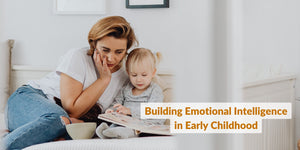
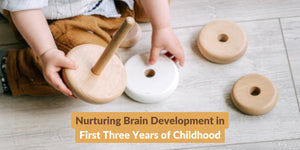

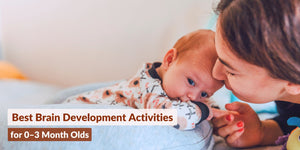

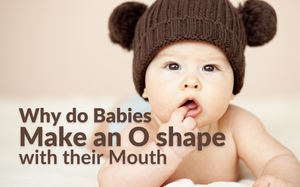
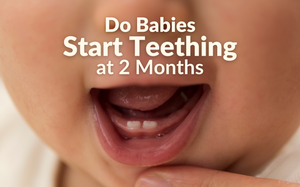
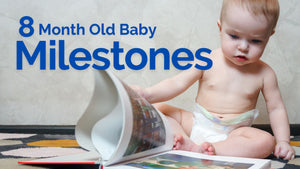
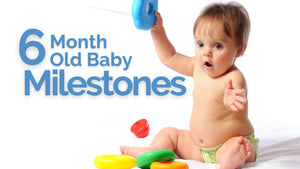

LEAVE A COMMENT